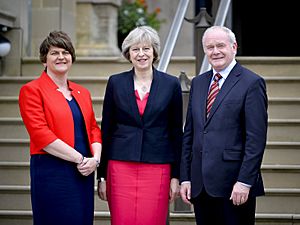New Decade, New Approach facts for kids
| Signed | 9 January 2020 |
|---|---|
| Location | Belfast, Northern Ireland |
| Effective | 9 January 2020 |
| Parties | |
| Language | English |
The New Decade, New Approach (NDNA) is an important agreement made on 9 January 2020. It helped bring back the government in Northern Ireland, called the Northern Ireland Executive. This government had been paused for three years because of a big problem with a heating plan.
The agreement was worked out by Julian Smith, who was the UK's Secretary of State for Northern Ireland, and Simon Coveney, who was Ireland's Tánaiste (Deputy Prime Minister).
On 11 January 2020, the Northern Ireland Executive started working again. Arlene Foster became the First Minister, and Michelle O'Neill from Sinn Féin became the Deputy First Minister. All five main political parties joined the government. Other ministers included Edwin Poots, Robin Swann, Nichola Mallon, Gordon Lyons, and Declan Kearney. Naomi Long, the leader of the Alliance Party, became the justice minister. Arlene Foster said it was "time for Stormont to move forward."
Part of this agreement meant that many ideas for an Irish Language Act would be put into action. Instead of creating a brand new law, existing laws would be changed. Many other important plans were also part of the deal.
Contents
Why Was the Agreement Needed?
Why Did Northern Ireland's Government Stop Working?

Northern Ireland's government, the Executive, stopped working in 2017. This led to new elections being held very quickly. These elections were special because, for the first time in Northern Ireland's history, parties that support staying part of the UK (called unionist parties) did not win the most seats. This was partly because of a problem with a heating plan and other political issues.
Under a law called the Northern Ireland Act 1998, if a government isn't formed within six weeks, another election must happen. After the 2017 elections, the British and Irish governments tried to help the parties agree. They wanted to get the government working again.
During this time, two different Secretaries of State for Northern Ireland, James Brokenshire and Karen Bradley, tried but couldn't get the Executive back. To stop more elections from happening, the British Parliament passed new laws. These laws extended the deadline for forming a government and allowed the UK Parliament to make decisions on some local issues. Finally, in January 2020, Julian Smith helped the parties reach the New Decade, New Approach agreement, which brought the government back.
What is the Irish Language Act?
An Irish Language Act is a proposed law that would give the Irish language the same official status as English in Northern Ireland. This is similar to how the Welsh language is treated in Wales under the Welsh Language Act 1993.
Political parties like Sinn Féin, the SDLP, the Alliance Party, and the Green Party support this law. However, the Democratic Unionist Party and Ulster Unionist Party are against it.
In 2017, Gerry Adams, who was the leader of Sinn Féin at the time, said that there would be no government without an Acht na Gaeilge (Irish for "Irish Language Act"). By 2019, the Irish Language Act had become one of the biggest disagreements in talks about getting the Northern Ireland government working again. Many felt it was needed for a deal to happen.
What Was Agreed?
On 11 January 2020, Sinn Féin and the DUP agreed to restart the government under the New Decade, New Approach agreement. Arlene Foster became the First Minister, and Michelle O'Neill became the Deputy First Minister.
Irish Language and Ulster Scots
The agreement did not create a separate Irish Language Act. Instead, the Northern Ireland Act 1998 was changed, and new plans were put in place to:
- Give official status to both the Irish language and the Ulster Scots language in Northern Ireland.
- Create a new role called the Irish Language Commissioner. This person will "recognize, support, protect, and improve the Irish language in Northern Ireland." This will be part of a new Office of Identity and Cultural Expression, which will also have an Ulster Scots/Ulster British Commissioner.
- Introduce "language standards" that will be put in place step-by-step. This is similar to how the Welsh language is managed in Wales. However, the First Minister or Deputy First Minister can stop these standards from being put in place.
- Cancel a very old law from 1737 that banned the use of Irish in Northern Ireland's courts.
- Allow members of the Northern Ireland Assembly to speak in Irish or Ulster Scots. There will be a simultaneous translation system so everyone can understand.
- Set up a special team within the Northern Ireland government to translate documents.
Section 27 of the New Decade, New Approach agreement says that people in Northern Ireland have the right to see themselves as Irish, British, or both. It also promises to create a Commissioner to support the Irish language and another Commissioner to help the Ulster Scots/Ulster British traditions. The rules for the Assembly will be changed to allow business to be done in Irish or Ulster Scots, with translation provided.
- Further information: Identity and Language (Northern Ireland) Act 2022
What Happened Next?
First Minister Arlene Foster stepped down in May 2021. This happened after her party, the DUP, indicated they might vote against her. She was replaced by Paul Givan on 17 June 2021, and Michelle O'Neill stayed as Deputy First Minister.
However, Paul Givan himself resigned in February 2022. He did this because of disagreements with the UK government over the Northern Ireland Protocol. This led to new elections being called for 7 May 2022. No new laws about the Irish Language Act were passed before the 2022 Assembly election.
The UK Parliament later passed a law called the Northern Ireland (Ministers, Elections and Petitions of Concern) Act 2022. This law helped to put some parts of the New Decade, New Approach agreement into action.
 | Misty Copeland |
 | Raven Wilkinson |
 | Debra Austin |
 | Aesha Ash |



